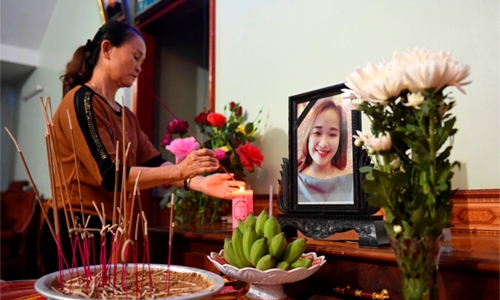Vietnam police take DNA from relatives of suspected truck victims
Police in Vietnam took hair and blood samples on Sunday to get DNA from relatives of people feared to be among the 39 who died in the back of a truck near London last week, their family members said. Distraught, Nguyen Dinh Gia said he feared there was very little chance he would ever again see his 20-year-old son, Nguyen Dinh Luong, who had been trying to get to Britain after first making it to France.
“Police from the Ministry of Public Security came to get DNA samples, our hair and blood,” Nguyen Dinh Gia said at Can Loc in Ha Tinh province, where sympathisers gathered at the simple house amid lush rice fields to console the family. “I advised him not to go because I told him that even though our family had always had nothing and our children were always in hardship, but we brought them up just fine,” Nguyen said.
The father of Pham Thi Tra My, who sent a last text message to her family in the early hours of Wednesday Vietnam time, said police had also been to collect samples of blood and hair. Vietnam’s government did not respond immediately for a request for comment. Vietnam’s prime minister has called for an investigation into the case. British police have said very few of the victims were carrying official identification and that they hope to identify the dead through fingerprints, dental records and DNA, as well as photos from friends and relatives.
The families of the suspected victims were in Nghe An and Ha Tinh, two of the poorest provinces in communist Vietnam. Nghe An was identified as home to many victims of human trafficking who end up in Europe, according to a March report by the Pacific Links Foundation, a U.S.-based anti-trafficking organisation. Ha Tinh was ravaged by one of Vietnam’s worst environmental disasters in 2016 when a steel mill owned by Taiwan’s Formosa Plastics contaminated coastal waters, devastating local fishing and tourism industries.
It was from Ha Tinh that Tra My set out, first to China, in the hope of making it to Britain via France. According to Human Rights Space, a civic network based in Vietnam, she sent one final apologetic message home. “I’m sorry, mum and dad. My path abroad was not a success. I love you both so much. I can’t breathe. I’m from Nghen Town, Can Loc District, Ha Tinh, Vietnam ... I am sorry, mum,” the message said.
Related Posts

